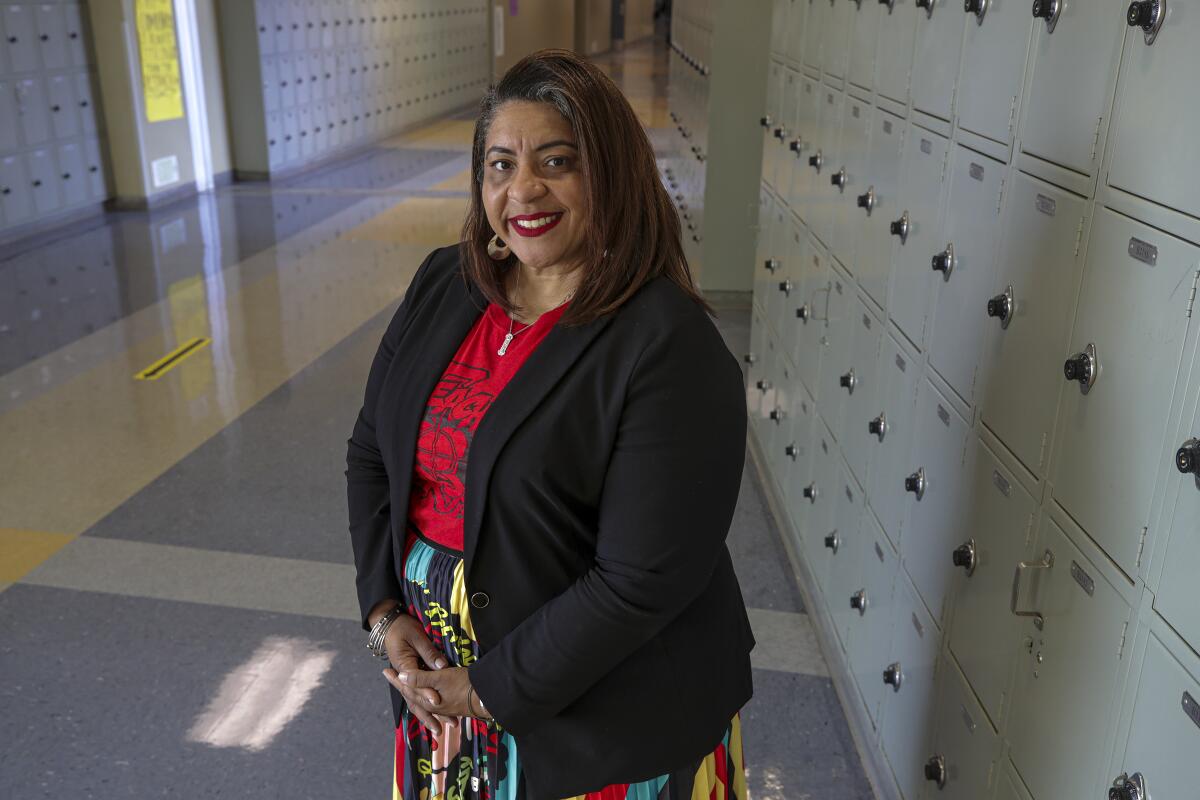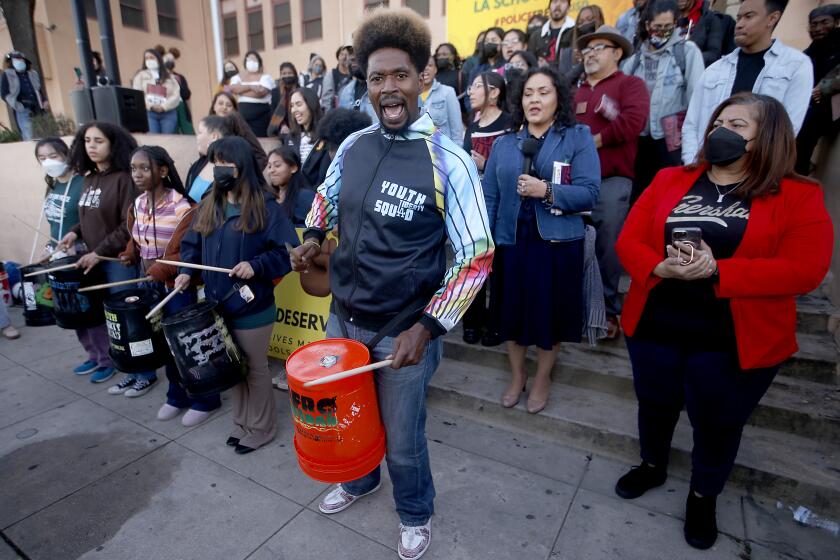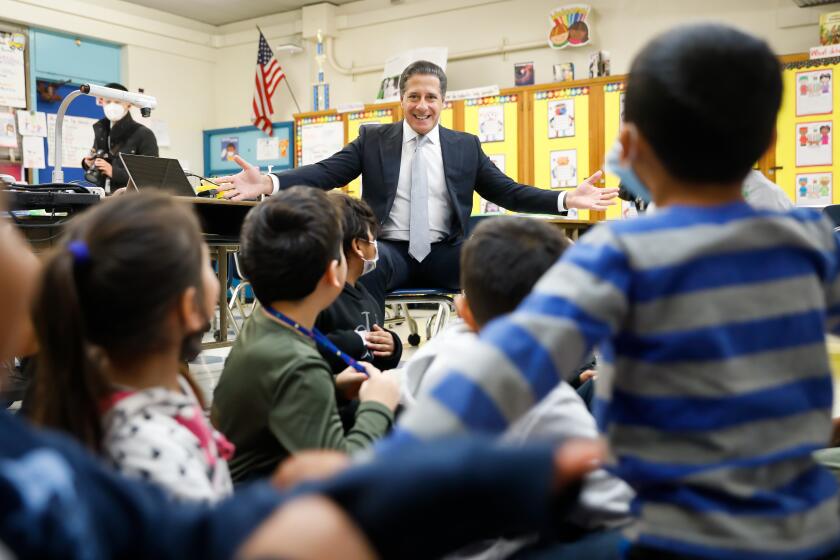L.A. teachers union reelects leader amid push for 20% raise, smaller classes, family aid

Cecily Myart-Cruz has won reelection as president of United Teachers Los Angeles, receiving three of every four votes cast, empowering her to maintain the union’s extensive social agenda and contract demands that call for a 20% raise over two years.
The heavy favorite, Myart-Cruz, 49, won a second three-year term with 75.5% of the vote. Veteran substitute teacher Leonard Segal finished second with 16.6% and Greg Russell, another long-time substitute teacher, had 7.9%.
Myart-Cruz was the first woman of color to head the union and has 26 years of teaching experience. She also is the parent of a district student.
The union represents about 35,000 teachers, librarians, counselors and nurses in the nation’s second-largest school system.
Myart-Cruz has positioned the union as a progressive voice for underserved Black and Latino students. The union wields significant influence over the education of Los Angeles children and was a driving force in district decisions about time spent in online learning and gaining early access to vaccines for teachers during the COVID-19 pandemic.
“The most direct way we can truly improve the lives of our students is to fight for just schools that value, respect and empower educators,” Myart-Cruz said in a statement. “I am more committed than ever to ensuring UTLA continues its laser-focus fight for a strong and equitable contract, proper funding and resources to make sure quality public education is available to all students, regardless of their ZIP Code, and ensuring teachers and LAUSD support staff receive the dignity and respect they deserve.”
Activists challenge L.A. Unified superintendent’s support of school police, as well as school board members who reduced the police budget but did not disband the agency.
Union leaders are expected to have a say in any renewed efforts to extend the school year or school day, which affects working hours. Leaders also will bargain over how and where to lower class sizes and weigh in on whether to shorten winter break from three weeks to two weeks. There’s also been a decades-long push and pull over who controls what happens at schools as far as teacher assignments, hiring and spending.
In ongoing contract negotiations, the union’s sweeping list of bargaining priorities includes such areas as funding for the Black Student Achievement Program, specifics on organizing the district, building affordable housing for low-income families, environmental justice, healthy food, trauma-informed teaching, techniques for de-escalation of conflict and increased access to ethnic studies.
“I love the fact that the platform also includes a support for housing,” said Cal State L.A. education Professor Jennifer McCormick, who has analyzed the union platform in connection with her teacher-training classes.
And despite its range, she added, the platform does not give short shrift to proposals directly tied to the quality of education, such as limiting the grade span that can be included in classes for students with disabilities,
As part of the bargaining process, the union has to prioritize which issues might be worth striking over, McCormick said.
In January 2019, teachers went on strike for six days and won some key concessions — such as a cap on class sizes — although the strike itself did not result in higher pay or better benefits. During the strike, the union enjoyed broad support from parents across the city — as teachers called attention to crowded classrooms and funding shortfalls. A year later, the union advocated aggressively for strict pandemic safety measures, including early and extended campus closures.
To avoid another strike, the union and school district must agree on wages that are generous enough to recruit and retain teachers as the district faces economic uncertainties.
For the campaign, Myart-Cruz had put together an all-woman slate that did not include three officers from her first term. The most notable change was the departure of union vice president Alex Caputo-Pearl, who had preceded Myart-Cruz as union president. Caputo-Pearl said he decided not to run for a second term as vice president.
The Myart-Cruz slate won five of seven citywide officer races. A slate put together by Segal did not win any. One race is going to a runoff.
Los Angeles Unified Supt. Alberto M. Carvalho has a high-voltage style and ambitious agenda, although it’s too soon to gauge his success as students struggle with pandemic setbacks.
The union under its current leadership has done “a masterful job” in challenging times, said retired teacher Joshua Pechthalt, a former UTLA officer and former president of the California Federation of Teachers.
“To be a public sector union these last few years has been incredibly difficult,” Pechthalt said, referencing the Supreme Court’s ending of mandatory public-sector union membership, the debate over remote schooling during the pandemic and the challenge of academic and emotional recovery.
Turnout for the union election was low, which is not atypical for union elections. Around 88%, or about 31,000, of more than 35,000 eligible employees belong to the union, according to documents obtained from the school district by the California Policy Center, a locally-based group that works, in part, to diminish the influence of public-sector unions.”
Of those 31,000 or so eligible to vote, 7,385 cast ballots for union president, about 24%. The union has not yet released official turnout figures.
Members felt strongly about Myart-Cruz as the best option on the ballot, said former union officer Gregg Solkovits. But there is still significant dissatisfaction and apathy in the ranks, partly as a result of the leadership’s lower level of attention to the day-to-day work of protecting members, he said.
“Some members no longer have faith that the union has their back when a situation comes up at a school,” Solkovits said. “Moving forward this is something that UTLA has to continue to work on to maintain support and not bleed membership.”
Online balloting began Feb. 7 and continued until 8 a.m. Tuesday.
More to Read
Sign up for Essential California
The most important California stories and recommendations in your inbox every morning.
You may occasionally receive promotional content from the Los Angeles Times.













